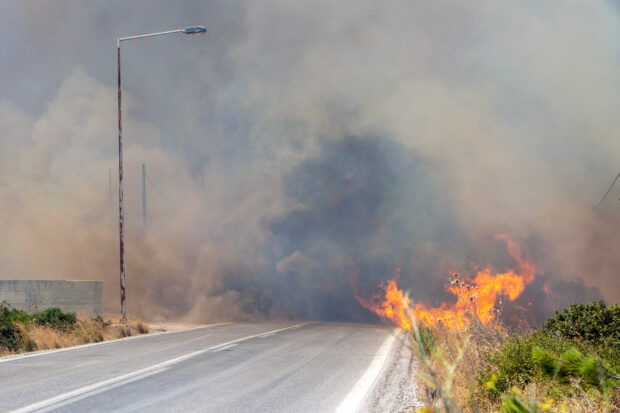
Flames and smoke rise, as a wildfire burns near the village of Kiotari, on the island of Rhodes, Greece, July 24, 2023. REUTERS FILE PHOTO
LONDON/FRANKFURT — Wildfires and evacuations on the Greek island of Rhodes, and a heat wave blasting much of southern Europe, have raised questions for tourists about their travel insurance coverage.
As the threat of fires remains high throughout Greece and heat continues elsewhere at the peak of the summer holiday season, here are some of the key questions and answers:
What is travel insurance?
Travel insurance is “primarily” to protect against high costs of emergency medical care while abroad, according to the Association of British Insurers (ABI).
Travelers should check the exact terms with their individual insurers and tour operators.
What if you fall ill due to heat, or your accommodation is affected by wildfires?
If someone gets sick due to heat while on holiday, British insurer Aviva, for example, would cover the costs of medical care and getting home if needed. Aviva would also cover the cost of moving to new accommodation should a booking become uninhabitable due to a wildfire.
German insurer Ergo would pay for any additional costs if a traveller couldn’t leave their travel destination due to fire.
What does travel insurance not cover?
It won’t cover cancellation for travelers who decide not to take their trips because of the heat.
What do natural catastrophes cost insurers?
Hurricane Ian in the United States and floods in Australia helped to make 2022 one of the costliest years on record for natural disasters, according to Munich Re, which said losses totaled around $120 billion.
Insurers are increasingly turning their backs on some markets like Florida, prone to hurricanes that insurers forecast will become more intense as the climate warms, and California, where wildfires are common.
Are insurers rethinking coverage due to the Greek fires?
Ergo said such events have been taking place for decades, and that it was “continuously” assessing the risks.
“The intensity of the fires in Greece is not a reason for ERGO Travel Insurance to change the scope of benefits,” it said.
Will the Greek fires affect insurance premiums and insurers?
They haven’t much so far, according to ratings agency Fitch, which called travel insurance a niche product and said it was too early to see changes in terms and conditions.
Though price increase for policies can be expected, “the COVID-19 pandemic posed a much more severe and widespread risk for travel insurance – and suppliers did not cut back on capacity,” said Robert Mazzuoli, director in the insurance team at Fitch. He added that the affected region in Greece is a small part of the overall market.
Travel insurance prices have been rising. How much and why?
Travel insurance premiums have risen around 10% this year from last year in many European markets as insurers try to claw back COVID-19 losses, said Marcos Alvarez, global head of insurance credit ratings at DBRS Morningstar. He expects they could rise by another 10% next year.
Many insurers are diversified, limiting their financial hit from travel. Travel insurers have been carving out extra coverage, like for travel disruption, and charged extra premiums for them.
How big is the travel insurance market?
Fairly small. U.S. residents spent $1.72 billion on travel insurance in 2020, according to the U.S. Travel Insurance Association.
By contrast, global insurance premiums were estimated be 5.6 trillion euros ($6.20 trillion) in 2022, according to German insurer Allianz.
How are tour operators reacting to the Greek fires?
Tour operator TUI had 39,000 guests on Rhodes on Sunday evening. Some 7,800 of those were affected and taken to other hotels or shelters. On Monday, it deployed six extra planes to fly home German and British holidaymakers.
The operator is cancelling trips to Rhodes in the coming days and offering free cancellations or rebookings to other TUI destinations.
What about people who have just booked flights?
The airline Condor said it would rebook flights to Rhodes for free.
($1 = 0.9029 euros)
RELATED STORIES